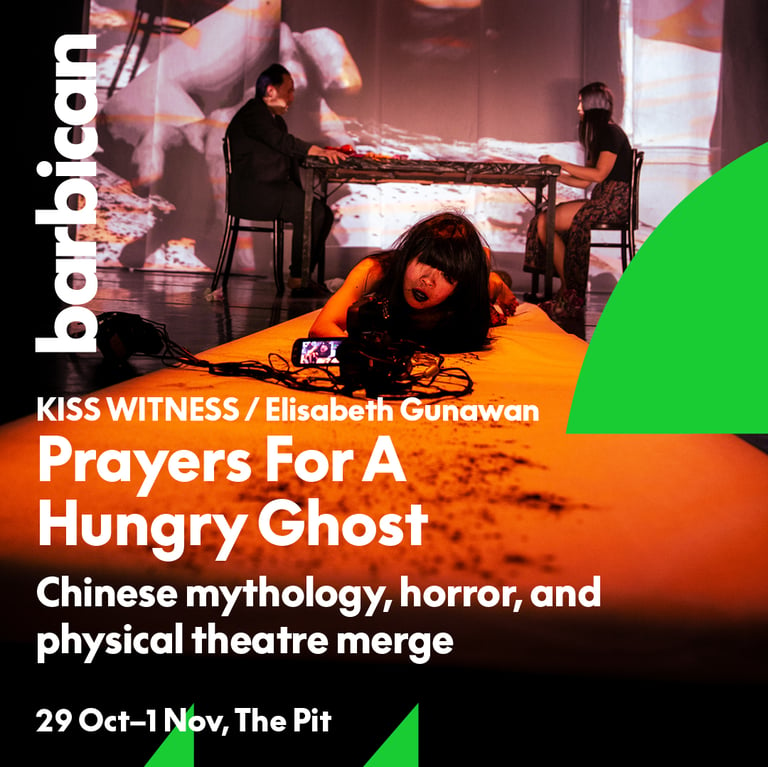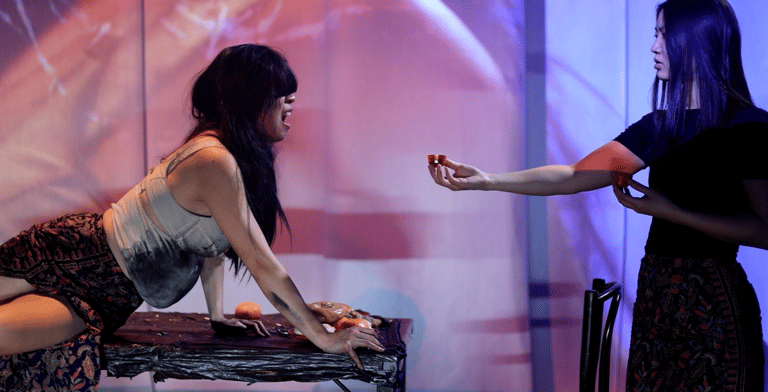Interview with Elisabeth Gunawan: Theatre Becomes an Extremely Important Space for Humans to Be with Other Humans
Buddhist legends? Ghosts? Model minorities? In contemporary right leaning Britain, what connections do we share as human beings? Listen to Elisabeth Gunawan as she talks about the creative process behind her work Prayers for a Hungry Ghost.
INTERVIEWSFEATURED
T Wu
9/25/20255 min read


Interviewer: Kassy Fang
Interviewee: Elisabeth Gunawan / KISS WITNESS
Q: The piece is set in the underworld of hungry ghosts and follows a family through themes of trauma and legacy. How did you approach developing the story and world of the piece?
In Buddhist lore, it is believed that people who were violent, greedy and clinging in their lives are reborn into hungry ghosts with huge empty bellies and fire in their mouths that turn everything they eat into ash. I think this is such a potent image to explore the fractures and intergenerational trauma in Chinese diasporic identity!
For me, developing a piece is a bit like pickling—the idea ferments beneath the surface of the conscious mind for years before it can take shape as a performance. Prayers for a Hungry Ghost began as a series of poems I wrote in a moment of existential panic in the summer of 2021, when my father was very ill and I was far from home. It then grew into a play, a work-in-progress sharing in 2023, and now, finally, its premiere. However, the textures, idiosyncrasies and nature of the piece have always felt clear. I think we want to bring the audience into a dark landscape of anguish and clinging, desire and grief. The piece exists in an emotional and intuitive (as opposed to intellectual) space, so I wanted the piece to feel sensual. Like a fever dream. Throughout, I’ve tried to stay with the not-knowing—to make choices without always understanding them at first, and then discover their meaning through the doing.
Q: The show uses horror as a central aesthetic. What drew you to horror as the genre to tell this story, and how does it speak to the themes of trauma, migration, or the unseen things that haunt families?
Avery Gordon describes ghosts as a form of social imagination. Who’s to say ghosts are astral beings, rather than thoughts, memories, or questions that linger at the corner of your eye? When something burrows into your soul and won’t let go, isn’t that also a haunting? Horror, in this sense, becomes a powerful way to explore silences, historical erasures, and traumas that remain unspoken. Speaking from personal experience, my parents have lived through violence and discrimination that they don’t want to or are unable to talk about. However, there is still a need to reckon with this past trauma, which has undoubtedly shaped my life as well as theirs.
Q: The idea of the “model minority” is deeply ingrained in how East and Southeast Asians are perceived. How does Prayers for a Hungry Ghost confront or dismantle this narrative on stage?
Here in the UK, there are contemporary perceptions of Chinese communities as model minorities (an identity that a lot of Chinese people also embrace). But what that means is, we need to earn our right to existence by assimilating into the dominant culture’s way of speaking, dressing, working, and other currencies of success. The aspirational narrative of the model minority might seem triumphant, but such is its dehumanising logic: you will be permitted into our midst if you assimilate and agree to toe the line. And if you are abused and oppressed, you will remain silent, and you will not threaten this hierarchical system that has been established.
Q: You’ve spoken about wanting to show East and Southeast Asian characters as complex and individual, with contradictions and vulnerability. Why is that depth of representation important to you, especially in the context of British theatre?
Because it’s still incredibly nascent! How many times have we had Madame Butterfly or Miss Saigon, and other commercially successful productions that present white Western Europe’s perception of what Asian people are like, and what our worlds are? Personally, I think representation is meaningless if our bodies are simply being borrowed to tell stories that do not allow us to have subjectivity. Even right now, with the UK being struck by far-right protests, there is still a widely accepted notion that the experiences and the suffering of white people are more important than those of people of colour. Stories are incredibly potent in their ability to reshape that, to broaden and deepen our understanding of a common, porous humanity.
Q: You’ve said this is “the story of my family, and of many migrants”. How personal was this work for you, and how did that affect your creative process?
As a Chinese Indonesian person, one of our most formative experiences was the May 1998 riots, which unleashed a wave of violence against ethnic Chinese communities. At that time, our entire family tried to seek asylum in the US before eventually returning to Indonesia. I didn’t go to school for months. Until now, my parents hated America, and they hate political protests and demonstrations - their idiosyncrasy is a logical response to the trauma they experienced. They decided to put their heads down and work very hard because economic success was one of the few valid currencies they could protect themselves with. But model minorities have the appearance of acceptance, while being gaslit into accepting second-class citizenship, and being treated as if we are not psychologically real human beings. All our rewards—social acceptance, economic success- are like food entering the scorching mouth of a hungry ghost. I feel that I’ve seen this sickness of hungry ghosts in my family and my community, the result of unfulfilled desires and a constant clinging to structures that will always subjugate us in spite of promises to protect us. It will never be satisfied until a deeper need to be seen and recognised is met.
Q: Is there a moment, image or detail that holds particular meaning for you, even if audiences might not notice it straight away?
In her moment of deepest hunger and anguish, the character I play, Big Sister, breaks the empty plate and begins to eat the broken glass. I drew this image from Javanese esoteric traditions. During rituals or spirit possession, the possessed often demonstrate their temporary ascension to the supernatural by walking over burning coals or broken glass. It’s ambitious, but in a way, the piece seeks to summon the hungry ghosts into the space, to witness them. Because grief needs a witness.
Q: The production was developed with a female-led, all-ESEA cast and creative team. How did that shared cultural and creative space influence the energy or direction of the piece?
I’m a big believer of this quote by Nell Irvin Painter – “make art only you can make, and make a lot of it!” I think our pieces of art are like our children, and ultimately are formed from pieces of ourselves – our stories, how we see the world, what interests us. I couldn’t tell you exactly how, and I wouldn’t want to essentialise the kind of art the female East and Southeast Asian creatives make, but it’s certainly deeply ingrained in the work.
Q: What do you hope stays with people after seeing this, especially those who may not share a similar background?
I hope the piece touches people in their souls. I hope they are, even for a brief moment, haunted by this piece.
The UK is moving swiftly to the right. As a person who doesn’t hold those values and beliefs, I find myself feeling pulled into argumentative spaces. But bigoted and prejudiced beliefs, by their very nature, are not logical. That’s where I think theatre becomes an extremely important space for humans to be with other humans, on a level much deeper and more visceral than the intellectual, ultimately towards raising our consciousness.
©️Prayers for a Hungry Ghost, photo by Genevive Reeves
Prayers For A Hungry Ghost by KISS WITNESS world premiere in The Pit, Barbican runs Wed 29 0ct - Sat 1 Nov 2025. barbican.org.uk (Standard £20, £10 Young Barbican tickets available)
Prayers for a Hungry Ghost is part of cross-arts organisation Kakilang’s season celebrating world-class performances by East and Southeast Asian artists. This production has been created through the Barbican’s prestigious Open Lab talent development programme


©️Prayers for a Hungry Ghost, photo by Genevive Reeves
Sound Behind Curtain
A place for all Asian artists.
© 2026 Sound Behind Curtain. All rights reserved.
Your gift keeps the curtain rising for Asian creatives.
About
Contact
